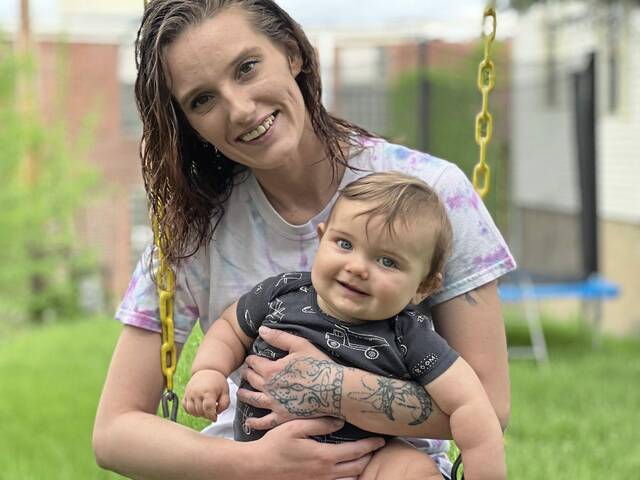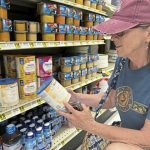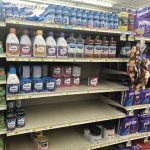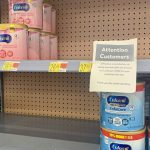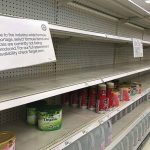The Enfamil formula Katie Feola feeds her 10-month-old daughter, Grace, has been getting scarce over the last few weeks.
The Delmont woman noticed four months ago that there seemed to be less available. The family would sometimes go weeks without seeing any at a store.
“Now it’s like months that we’re not finding any of it,” she said. “We’ve been asking around probably for a whole month now.”
She and her husband have enlisted the help of family, friends and co-workers, as well people on Facebook, to find the specific type of formula for Grace. The formula shortage adds stress to raising Grace and her 2-year-old brother, Nathan.
Many parents are finding themselves in the same situation, the result of supply chain disruptions and a major safety recall that shut down production at a key supplier of baby formula. The effects have cascaded. Retailers are limiting purchases as families resort to panic-buying.
Doctors and health workers warn parents not to take desperate measures that will endanger the child, such as watering down formula to stretch supplies. The worst are homemade formula recipes, often found online, which can cause direct harm.
“It’s a very real thing,” said Tara Truscott, outreach coordinator at the Western Pennsylvania Diaper Bank in Mt. Pleasant. “We’ve heard a lot of people in the beginning when this first started coming out saying, ‘It’s not a real issue’ or ‘It’s not something that they believe truly exists.’ And then now that it’s blowing up and it’s becoming a huge thing, now everybody is really noticing how horrible it is to not be able to feed your child.”
Pediatricians typically recommend parents stick with a specific brand of formula that works for their child. But the regular forms of many brands can be largely interchangeable for babies who don’t have medical problems, said Dr. David Wyszomierski, a pediatrician at Excela Square Latrobe.
However, parents who use specialized forms of a brand of formula should check with their doctor to see if something else might work. That can mean babies who were born premature or are under a certain age, as well as others who have digestive or other medical issues.
“Certain babies are special cases and, especially if a baby has some sort of major medical problem, they definitely should talk to their pediatrician before switching,” he said.
His office has been getting a lot of calls as the issue wears on.
Wyszomierski warned parents against attempting to make their own formula. Those products have a complex set of ingredients that are balanced to meet a child’s needs.
Attorney General Josh Shapiro on Friday issued an alert that parents should be wary of formula being sold online. Make sure the item is from a reputable source as scammers can take advantage of consumers during times of product scarcity, he said. Anyone who believes they may have been scammed can file a report with his office.
In Westmoreland County
At the two Shop’n Save stores in Greensburg, there were shelves lined with Abbott Nutrition’s Similac formula, with boxes of more Similac.
The problem with lack of supply of available baby formula, said Jeff Skatell, a Shop’n Save manager, is partially due to the recent voluntary recall of some baby formula. Skatell said they order the baby food formula on a nightly basis in order to get more formula.
In mid-February, Abbott Nutrition recalled three brands of powdered formulas — Similac, Similac Alimentum and Elecare — that were produced at its plant in Sturgis, Mich. The recall was made because four babies became sick with a bacterial infection after ingesting the formula. The formulas may have been contaminated with Cronobacter sakazakii or salmonella, although Abbott said its tests did not find the Cronobacter bacteria, nor salmonella in the distributed batches of baby formula. Two babies had died, according to the Food and Drug Administration.
The FDA said on Friday it had concluded its investigation into the baby formula produced at the plant and Abbott said it could resume production in a few weeks, upon receiving FDA approval.
But Kate and Michael Valentino, who were shopping for baby food at a Shop ‘n Save in Greensburg, said they avoid buying Similac because of the recent recalls.
“It’s been extremely challenging,” Kate Valentino said, to find formula for their 8-month-old daughter, Alice. “It’s been terrible for us.”
Michael Valentino said he believes that stores should implement limits on purchases of baby food, just like they limited purchases of products at the beginning of the pandemic two years ago.
“It’s extremely challenging. You can check 30 stores in a week and no one has any,” Michael Valentino said.
Beverly’s Birthdays, a North Huntingdon-based organization that offers birthday cheer and baby care items for children of families in need, started providing baby formula to clients when the covid pandemic arrived.
Founder Megan Yunn estimated her nonprofit, working with partner agencies, has distributed more than 2,500 cans of formula since March 2020.
With the recent supply chain issues and manufacturer’s recall, daily requests the organization receives for formula have grown from about two to five, Yunn said.
Like the families it serves, Beverly’s Birthdays has found it more difficult to source formula, particularly versions tailored for infants with sensitive stomachs.
“You can’t even purchase it through the manufacturer now,” Yunn said of sensitive formula. “We hope to see some relief in about six to eight weeks,” provided production catches up with demand.
By then, there may be a new area source of formula for families in need.
Yunn said Beverly’s Birthdays is working to establish the Greater Pittsburgh Infant Formula Bank in partnership with the Family Centers of Allegheny County and Hello Baby, a collaborative effort by organizations in Allegheny County to offer various supports to families.
Details of that program are still in the works.
Yunn urged families who can’t obtain the infant formula they normally use to check with their pediatrician about options for switching to a different brand or type of formula.
To protect the infant’s health, she said, “Do not follow any social media suggestions for making your own formula or trying varieties that are on TikTok.”
Washington County resident Alexis McCollum has turned to Yunn for help in obtaining more formula now that she’s down to two 19.5-ounce cans of the easier-to-digest variety she uses to feed her 2-month-old daughter.
“She goes through a can a week,” said McCollum. “It’s been really hard to find,” whether she purchases the Enfamil brand or a generic substitute.
She said her search for the formula has become progressively more challenging over the past two months. She lucked out once by arriving at a local Walmart just as a shipment of cans arrived. At other times, she’s driven a half-hour to search the shelves of another store.
“It’s been really stressful on parents,” she said. “What are we supposed to do? “It’s not just a shortage any more, it’s a crisis. It’s just crazy.”
In the Alle-Kiski Valley
Shoppers at Walmart in Harrison were scouring store shelves for baby formula and mostly came up empty. On Friday, Sara Greenlee was on the hunt for a particular type of Enfamil used for sensitive stomachs but was greeted by empty shelves.
“I’ve been to Giant Eagle, Community, Target, CVS and Sam’s,” said Greenlee of Harrison. “It’s getting a little scary.”
Some grocers, like Walmart, are limiting the number of containers that shoppers can purchase. The Harrison Walmart allows customers to purchase five per child at one time.
Randy Sprankle, co-owner of Sprankle’s Neighborhood Market in Leechburg, said he has fielded numerous calls from parents about their baby formula inventory.
As of Friday morning, the market had about 30 cans of formula on the shelves, ranging in price from $18 to $22 per can.
“If it’s like cat food, the baby formula shortage could get worse before it gets better,” Sprankle said. “What’s going to happen is, as the stories hit, customers are going to come in and wipe me out.”
Hailey Remaley, 25, of Vandergrift has a 9-month-old son, Derek. She said the impact of the crisis has affected her for more than five months.
“We have to switch his formula almost every time he runs out. I can’t have consistency,” Remaley said. “I can’t get any formula online. Yesterday I couldn’t find any and my friend gave me a can of hers.
“It’s very stressful because sometimes I don’t know if I’m going to have anything for my son to eat,” Remaley said.
Derek’s grandmother, Pam Dwire of Leechburg, stops in every grocery store she passes to check out the formula selections.
“I’m shocked and frustrated and can’t believe this is happening. What are you supposed to feed these babies?” Dwire asked.
O’Hara resident and new mom Annie Davis, 36, described the ongoing baby formula shortage as “wild.”
Davis said she was fortunately unaffected by the formula shortage because she ordered organic baby formula online from Hipp, a European formula maker from Germany.
“Almost all of my friends use European formula vs. U.S.,” Davis said.
When her now-14-month-old son outgrew his need for formula, Davis was looking to pay it forward to other moms by donating leftover cans.
“I was aware of the shortage and that’s why I donated,” Davis said. “I tried to put it (formula) on Facebook but it was flagged. I guess because it’s health-related it was sort of akin to me selling old medicine.”
Davis ultimately donated her formula surplus to The Napkin Network, based in Bethesda, Md.
Giant Eagle spokesman Dick Roberts said the O’Hara-based chain is working to keep the shelves well-stocked as it navigates the challenges facing the grocery industry.
“Like many areas throughout the supermarket, the availability of select infant formula has been impacted by supply chain challenges and manufacturer limitations,” Roberts said. “As the situation evolves, we will continue to adapt and work closely with our supply partners to meet the needs of our guests with the products that are available.”
Highlands Family Center, along East Fourth Avenue in Tarentum, has programs for parents that include food assistance, a diaper bank and WIC office.
Staff members said there is a limited supply of formula at the site to help some of its 1,300 clients who are hitting roadblocks trying to purchase the food elsewhere.
Lisa Matt, the Allegheny County WIC program director, said her office has been fielding questions and trying to help alleviate some of the frustration for families.
The state has been able to work with the USDA to provide viable formula replacements for those brands that were recalled, and that opened the ability for families not to have a bare cupboard. But the challenges with the supply chain extend to even the alternate formulas.
“That means families are still having to go store to store” Matt said. “Unfortunately, we have no control over that.” She suggested families could save at least some of their hassle by calling ahead to stores.
Shannon Waldschmidt of West Deer sprang into mom-mode assistance recently to help mothers desperately seeking baby formula. She created a private Facebook group called Baby Formula Finder! Pittsburgh Area.
“It’s amazing to see how many connections have been made in just the course of a couple of days,” said Waldschmidt, who formula-fed her two children. “It’s even more rewarding to hear that some parents are finding relief from the stress of finding formula from the group.”
The group’s membership roster swelled to 200 in less than 48 hours.
“I hope to continue to moderate the group until there isn’t a need for it anymore. And let’s hope that’s sooner than later,” Waldschmidt said.
In the event that formula remains unavailable, Matt of the WIC program said that under no circumstances should families make their own. “They’re not safe,” she said. “The babies won’t get the proper nutrient content, and it is absolutely not appropriate to make it at home.”
Matt repeated the advice not to added extra water to thin formula — it can provide babies with too much water. She said many questions can be answered by visiting the WIC website at pawic.com.
Hospitals turn to milk bank
At the Mid-Atlantic Mother’s Milk Bank in Pittsburgh, executive director Denise O’Connor said the nonprofit is part of the solution, but only a small fraction.
“We’ve really been seeing it escalate with the shortages,” she said. “We’ve been up 20% the past two weeks.”
More than 70% of the milk bank’s human breast milk donations are shipped to hospitals in Pennsylvania and neighboring states, to the tune of about 30,000 ounces per month.
“The hospitals are leaning really heavily on us,” O’Connor said. “And they’re finding that specialty formulas they use for some babies are getting hard to find.”
Infants undergoing dialysis, for example, use a highly specific type of formula.
“That was affected by the recall, and now the shortage, and so a lot of those families are using donor milk,” O’Connor said.
And while the bank is able to help infants with medical needs, its stores would not provide a feasible alternative to traditional grocery-store baby formula.
“A healthy baby is drinking up to 25 ounces of milk a day,” O’Connor said. “We’d never be able to keep up with that.”





